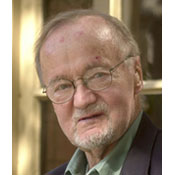Thanks to the ever-watchful Normblog, I encounter an article by Colin Tatz inveighing against talk about sport. Norm is right to call Tatz to account for writing nonsense – talk about sport is just as meaningful as talk about politics, history, religion, nuclear deterrence, genocide, or any other real-world human activity. Tatz says:
Sport is international phatic but also a crucial Australian (male) vehicle. It enables not just short, passing greetings but allows for what may seem like deep, passionate and meaningful conversations but which in the end are unmemorable, empty, producing nothing and enhancing no one.
Unmemorable?! Really? What Australian could forget Norman May’s shouted “Gold! Gold for Australia! Gold!” commentary at the end of the men’s 400-metre swimming medley at the 1980 Olympics in Moscow. Only a churlish gradgrind could fail to be enhanced by hearing this. And what Australian of a certain age could forget the inimitable footie commentary of Rex Mossop, including, for example, such statements as, “That’s the second consecutive time he’s done that in a row one straight after the other.” Mossop’s heat-of-the-moment sporting talk was commemorated with his many winning places in playwright Alex Buzo’s Australian Indoor Tautology Pennant, an annual competition held, as I recall, in Wagga Wagga, Gin Gin and Woy Woy (although not in Woop Woop or in The Never Never), before moving internationally to exotic locations such as Pago Pago, Xai Xai and Baden Baden. Unmemorable, Mr Tatz? Enhancing no one? Really? To be clear, these are not memorable sporting events, but memorable sporting commentary. And all I’ve mentioned so far is sporting talk, not the great writers on baseball, on golf, on cricket, on swimming, . . .
But as well as misunderstanding what talk about sport is about and why it is meaningful, Tatz is wrong on another score. He says:
But why so much natter and clatter about sport? Eco’s answer is that sport “is the maximum aberration of ‘phatic’ speech”, which is really a negation of speech.
Phatic speech is meaningless speech, as in “G’day, how’s it going?” or “have a nice day” or “catch you later” — small talk phrases intended to produce a sense of sociability, sometimes uttered in the hope that it will lead to further and more real intercourse, but human enough even if the converse goes no further.
Phatic communications are about establishing and maintaining relationships between people. Such a purpose is the very essence of speech communication, not its negation. Tatz, I fear, has fallen into the trap of so many computer scientists – to focus on the syntax of messages, and completely ignore their semantics and pragmatics. The syntax of messages concerns their surface form, their logical structure, their obedience (or not) to rules which determine whether they are legal and well-formed statements (or not) in the language they purport to arise from. The semantics of utterances concerns their truth or falsity, in so far they describe real objects in some world (perhaps the one we all live in, or some past, future or imagined world), while their pragmatics concerns those aspects of their meaning unrelated to their truth status (for example, who has power to revoke or retract them).
I have discussed this syntax-is-all-there-is mistake before. I believe the root causes of this mistaken view are two-fold: the mis-guided focus of philosophers these last two centuries on propositions to the exclusion of other types of utterances and statements (of which profound error Terry Eagleton has shown himself guilty), and the mis-guided view that we now live in some form of Information Society, a view which wrongly focuses attention on the information transferred by utterances to the exclusion of any other functions that utterances may serve or any other things we agents (people and machines) may be doing and aiming to do when we talk. If you don’t believe me about the potentially complex functionality of utterances, even when viewed as nothing more than the communication of factual propositions, then read this simple example.
If communications were only about the transfer of explicit information, then life would be immensely less interesting. It would also not be human life, for we would be no more intelligent than desktop computers passing HTTP requests and responses to one another.
